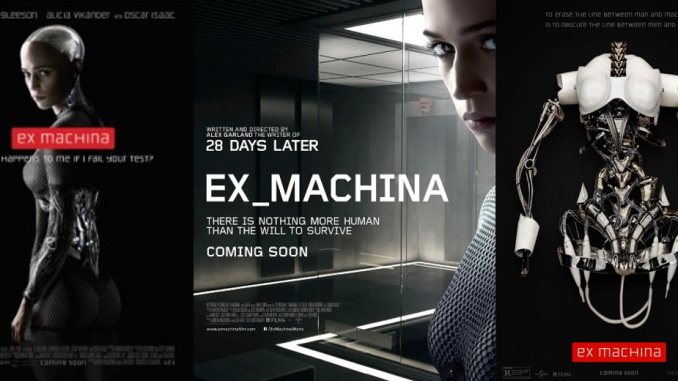
Director: Alex Garland
Writer: Alex Garland
Actors: Alicia Vikander, Domhnall Gleeson, Oscar Isaac
Country: UK
Finally, finally, finally, Hollywood delivers a movie about Artificial Intelligence and the Technological Singularity that is not entirely dystopian and filled with rampaging Terminator cyborgs. Not since Duncan Jones’ 2009 sleeper hit, Moon, has a sci-fi movie come along that is as cerebral, atmospheric, elegant, and suspenseful as Ex Machina.
Nathan (played by Domhnall Gleeson) is selected to conduct the Turing Test on a cyborg created by Caleb, owner of the largest search engine in the world (played by Oscar Isaac). The traditional Turing Test requires a conversation between a human and an unseen interlocutor. If the human can’t guess that the interlocutor is a computer, then that computer has passed the Turing Test and may be declared conscious. In the film, the subject of the Turing test is Ava, the eerily seductive and elegantly helpless AI played by Alicia Vikander in a cyber-erotic, techno-inspired salacious exoskeleton. Her beguiling form and alluring features cause at least one of the protagonists to fall in love with her, leaving the viewer to wonder whether the film ought not to have been called Sex-Machina instead.
Perhaps the highlight of the film is Caleb’s character – a geeky, menacing genius, with a lavish dollop of megalomania – a cross between H. G. Wells’s Dr Moreau and Kurtz from Joseph Conrad’s haunting book, Heart of Darkness. Like Kurtz, Caleb is secluded from the rest of humanity and takes on himself a burden of immense consequence. While Kurtz’s was the white man’s burden of bringing civilisation to Africa, Caleb’s burden is ushering in the Singularity and creating the first true humanoid A.I. He is well aware of the ramifications of his project – in his own words: “One day the AIs are going to look back on us the same way we look at fossil skeletons on the plains of Africa. An upright ape living in dust with crude language and tools, all set for extinction.” But just like Kutrz, Caleb has become corrupted and has lost sight of his original ambitions.
Students of Literature will be aware that the title of the film, Ex Machina is from the Latin expression Deus ex machina (literally “God from the machine”) and refers to a literary device in which a convoluted plot is resolved by the sudden appearance of gods who set everything right.
What’s fascinating about the film are the mind games being played by the three protagonists: who is pulling the wool over whom? The film progresses at just the right pace and the suspense constantly builds up until the climactic reveal and the intriguing denouement.
The film grapples with the themes of consciousness, death, human rights, and the future of humanity. How does one decide an entity is sentient? Ought humans be allowed to marry cyborgs? How do we know if an AI is self-aware? Is switching it off the same as murder? In a 21st century world where courts are deliberating whether or not to grant human rights to orang-utans and chimps, this film caters to the prevailing zeitgeist and comes as a timely reminder that we had better start getting our act together in preparing for the advent of AIs. Ultimately, much of our anxiety stems from our lack of understanding of how most technologies and gadgets work and from our lack of trust in big brother corporations and surveillant governments.
The list of dystopian films about AI is long: Lawnmower Man, Blade Runner, Terminator, Transcendence, I Robot … Hollywood has been in a rut for a long time when it comes to portraying AI in an imaginative fashion. But along comes Ex Machina and delivers as promised. This futuristic film forces us to contemplate humanity’s role as future gods and how we will treat our self-aware creations. Because like it or not, the advent of sentient AI is not a matter of if, it’s simply a matter of when.